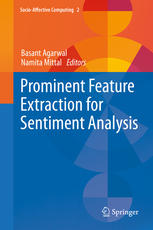

Most ebook files are in PDF format, so you can easily read them using various software such as Foxit Reader or directly on the Google Chrome browser.
Some ebook files are released by publishers in other formats such as .awz, .mobi, .epub, .fb2, etc. You may need to install specific software to read these formats on mobile/PC, such as Calibre.
Please read the tutorial at this link: https://ebookbell.com/faq
We offer FREE conversion to the popular formats you request; however, this may take some time. Therefore, right after payment, please email us, and we will try to provide the service as quickly as possible.
For some exceptional file formats or broken links (if any), please refrain from opening any disputes. Instead, email us first, and we will try to assist within a maximum of 6 hours.
EbookBell Team

0.0
0 reviewsThe objective of this monograph is to improve the performance of the sentiment analysis model by incorporating the semantic, syntactic and common-sense knowledge. This book proposes a novel semantic concept extraction approach that uses dependency relations between words to extract the features from the text. Proposed approach combines the semantic and common-sense knowledge for the better understanding of the text. In addition, the book aims to extract prominent features from the unstructured text by eliminating the noisy, irrelevant and redundant features. Readers will also discover a proposed method for efficient dimensionality reduction to alleviate the data sparseness problem being faced by machine learning model.
Authors pay attention to the four main findings of the book :
-Performance of the sentiment analysis can be improved by reducing the redundancy among the features. Experimental results show that minimum Redundancy Maximum Relevance (mRMR) feature selection technique improves the performance of the sentiment analysis by eliminating the redundant features.
- Boolean Multinomial Naive Bayes (BMNB) machine learning algorithm with mRMR feature selection technique performs better than Support Vector Machine (SVM) classifier for sentiment analysis.
- The problem of data sparseness is alleviated by semantic clustering of features, which in turn improves the performance of the sentiment analysis.